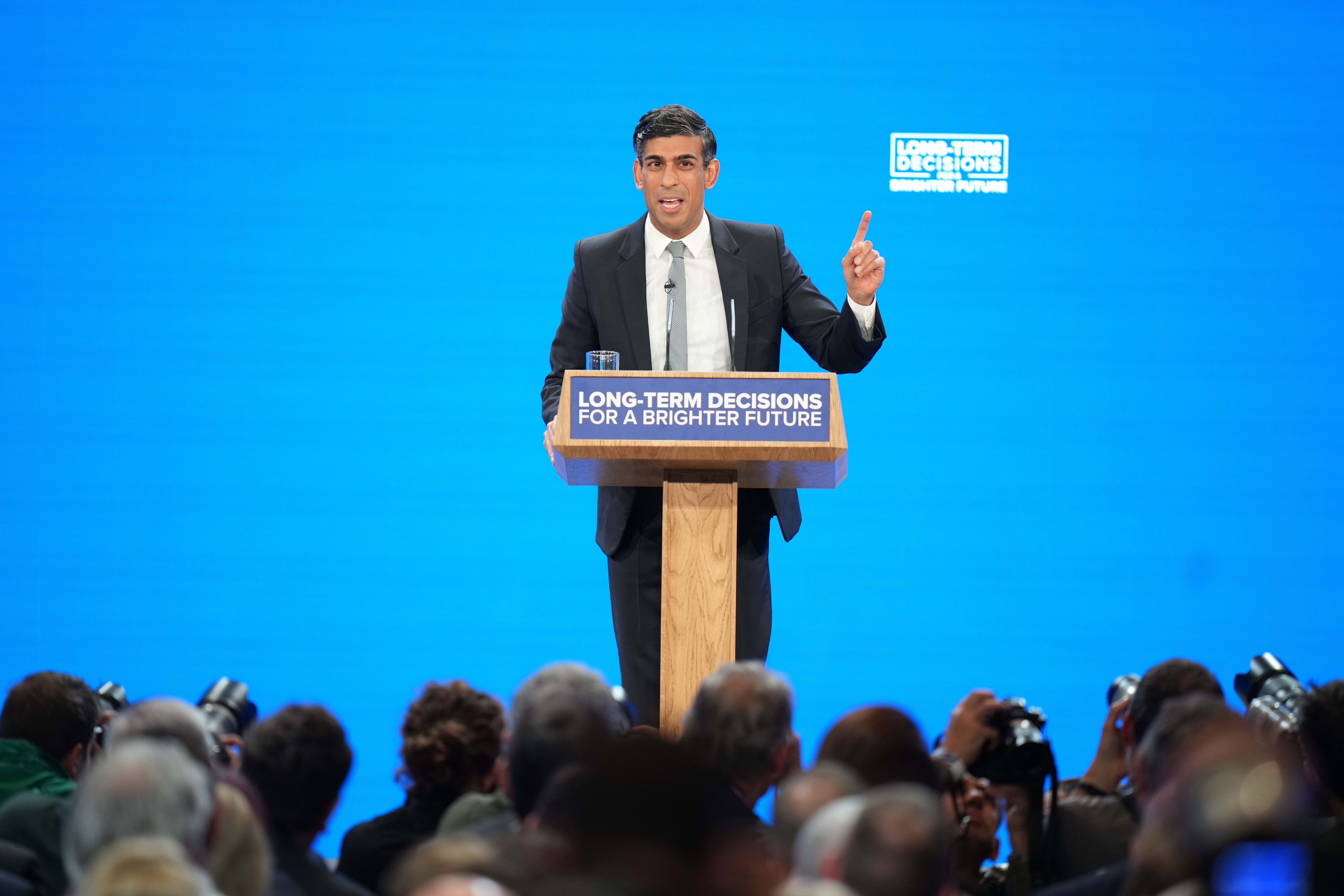Sums don’t add up for Rishi, ‘the change candidate’
The prime minister told the Conservative conference he wants to fix ‘30 years of broken politics’. But he ignored the inconvenient fact that his party has been in power for 13 years – and has run Britain for 17 of the last 30 years, writes Andrew Grice


For a numbers man who loves nothing more than poring over a spreadsheet when making decisions, Rishi Sunak has forgotten how to add up.
In his hour-long closing address to the Conservative Party conference, the prime minister pledged to end “the old consensus” of the last 30 years since the end of the Thatcher era. But he ignored who has run Britain during that time: we have had 17 years of Tory rule and a 13-year Labour regime in the middle. We have had six Tory prime ministers, from John Major to Sunak, and just two Labour premiers in Tony Blair and Gordon Brown.
Presenting himself as the change maker will not mask the Tories’ record since 2010. It risks highlighting the sense of a “broken Britain” in which nothing works; public services are creaking after Tory austerity with crumbling concrete in schools and sewage in rivers and seas; strikes remain unresolved; and the country’s biggest infrastructure project is doomed to remain half finished.
The PM is pleading with voters to give him a clean slate. It is a big ask.
I can see why he was tempted to acknowledge that next year’s contest will be a “change election”. Labour will be able to make it one after 13 years of Tory rule. But Sunak’s change pitch is a big gamble because it is a much, much easier one to make in opposition than government.
His three offers of change as he promised to replace short-termism with making the right long-term decisions were big enough. After three weeks of what insiders tell me was a “wobble, and being shaken by the backlash” after the Independent revealed his plan to scrap the Birmingham to Manchester leg of HS2, he finally bit the bullet, promising to invest the £36bn saved in hundreds of projects in the North and Midlands. But the symbolism of his decision will not be lost on Northerners; many will view it as the death knell for levelling up. It might also be seen as another shambolic U-turn.
Secondly, Sunak promised to cut cancer deaths by a quarter by raising the legal age for smoking by a year every year, a bold move that libertarians in his party will not like. Although he wouldn’t admit it, this felt like Sunak’s attempt to leave a legacy if his time in Downing Street is cut short by the election.
Thirdly, his worthy-enough pet project: a new qualification at 18, merging A-levels and T-levels, with students typically studying five subjects, including maths.
The speech will reassure some doubters in a party that does not yet love Sunak, because he showed he won’t go down without a fight. However, his three issues did not amount to a coherent long-term vision for the country.
While promising not to duck difficult questions like his Tory and Labour predecessors, he did precisely that in three important areas. There was no mention of housebuilding (on which he surrendered to “vested interests” on his own backbenches who are blocking the change the nation needs); the social care crisis, which compounds the NHS’s problems; and the triple lock on the state pension – surely even more unsustainable and unjustifiable than HS2.
Sunak’s radicalism is highly selective. He will deserve plaudits if he takes on his own party on these matters before the election, but I doubt he will. Similarly, his “change strategy” will work only if he openly criticises Boris Johnson and Liz Truss, which he has been reluctant to do so far. If he does, he will risk stoking divisions in a party which showed this week that it already has one eye on its next leadership election, rather than two eyes on the general election.
In 2019, Johnson convinced voters he was different to his Tory predecessors – but he was different; “not a typical Tory” was the verdict of many red wall voters. To many people, Sunak does look like just another Tory. His wealth and a suspicion he “can’t relate to the lives of people like me” comes through strongly in opinion polls and focus groups.
His “change strategy” might have worked against Jeremy Corbyn. It is unlikely to work against Keir Starmer, for all the attacks today’s speech confirmed the Tories will throw at him.
Labour has moved on from 2019 and learnt some painful lessons. The Tories are looking back, trying to preserve the electoral coalition Johnson created.
It is worth remembering why people voted Tory then. According to the More in Common think tank, the reasons they cite most are: stopping Corbyn (43 per cent); the Conservative Party policy on Brexit (42 per cent); trusting the Conservatives to support their interests (28 per cent); support for Johnson (28 per cent); and Conservative policies on the economy (24 per cent). These factors are not there now; the world has moved on. What will motivate people to vote for Sunak in big enough numbers? I don’t know.
Sunak was right to say there is “exhaustion with politics.” His problem is that many voters are exhausted with the Tories, and will simply not buy the idea that they can deliver the change they are looking for.






Join our commenting forum
Join thought-provoking conversations, follow other Independent readers and see their replies
Comments